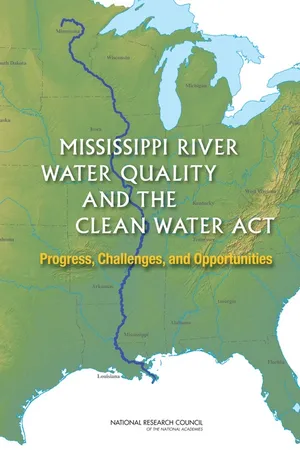
- 253 pages
- English
- PDF
- Available on iOS & Android
About this book
The Mississippi River is, in many ways, the nation's best known and most important river system. Mississippi River water quality is of paramount importance for sustaining the many uses of the river including drinking water, recreational and commercial activities, and support for the river's ecosystems and the environmental goods and services they provide. The Clean Water Act, passed by Congress in 1972, is the cornerstone of surface water quality protection in the United States, employing regulatory and nonregulatory measures designed to reduce direct pollutant discharges into waterways. The Clean Water Act has reduced much pollution in the Mississippi River from "e;point sources"e; such as industries and water treatment plants, but problems stemming from urban runoff, agriculture, and other "e;non-point sources"e; have proven more difficult to address. This book concludes that too little coordination among the 10 states along the river has left the Mississippi River an "e;orphan"e; from a water quality monitoring and assessment perspective. Stronger leadership from the U.S. Environmental Protection Agency (EPA) is needed to address these problems. Specifically, the EPA should establish a water quality data-sharing system for the length of the river, and work with the states to establish and achieve water quality standards. The Mississippi River corridor states also should be more proactive and cooperative in their water quality programs. For this effort, the EPA and the Mississippi River states should draw upon the lengthy experience of federal-interstate cooperation in managing water quality in the Chesapeake Bay.
Frequently asked questions
- Essential is ideal for learners and professionals who enjoy exploring a wide range of subjects. Access the Essential Library with 800,000+ trusted titles and best-sellers across business, personal growth, and the humanities. Includes unlimited reading time and Standard Read Aloud voice.
- Complete: Perfect for advanced learners and researchers needing full, unrestricted access. Unlock 1.4M+ books across hundreds of subjects, including academic and specialized titles. The Complete Plan also includes advanced features like Premium Read Aloud and Research Assistant.
Please note we cannot support devices running on iOS 13 and Android 7 or earlier. Learn more about using the app.
Information
Table of contents
- FrontMatter
- Preface
- Contents
- Summary
- 1 Introduction
- 2 Characteristics of the Mississippi River System
- 3 The Clean Water Act
- 4 Implementing the Clean Water Act Along the Mississippi River
- 5 Evaluating Mississippi River Water Quality
- 6 Agricultural Practices and Mississippi River Water Quality
- 7 Collaboration for Water Quality Improvement Along the Mississippi River Corridor
- References
- Appendixes
- Appendix A: Guest Speakers at Committee Meetings
- Appendix B: Acronyms
- Appendix C: Biographical Information: Committee on the Mississippi River and the Clean Water Act